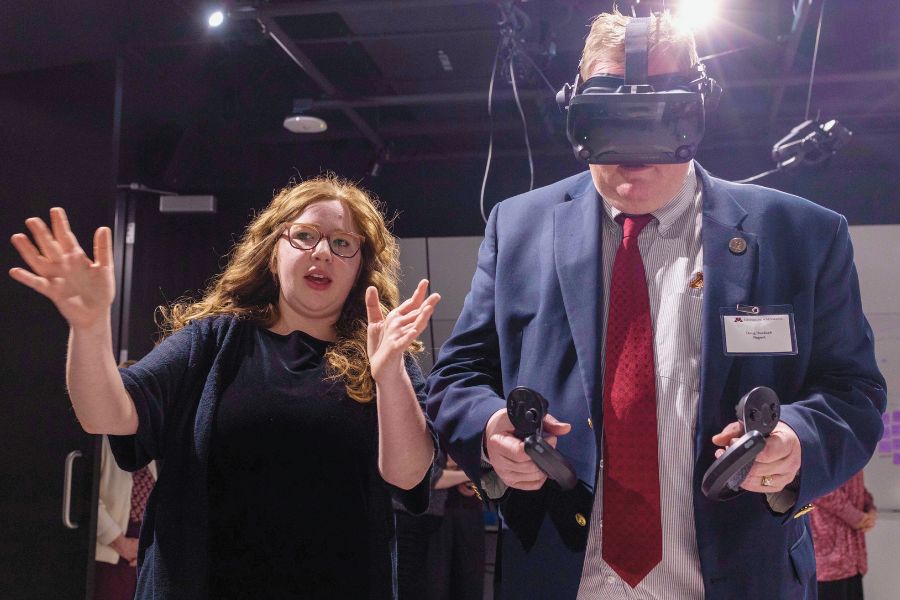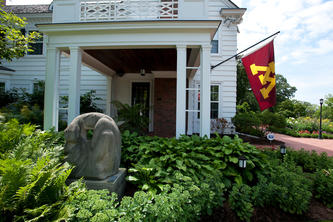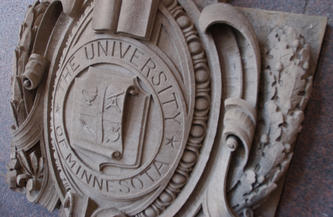
The Board toured several health sciences spaces on the Twin Cities campus as part of its March meetings.
Members of the Board of Regents experienced academic medicine firsthand through a full day of on-site activities across the University’s health science schools on the Twin Cities campus. The visit highlighted various components of the University’s innovative and interprofessional education model, which develops Minnesota’s future health care workforce and drives new knowledge to improve patient care.
“As the University considers its approach to enhance and expand the impact of our academic health system, Thursday’s tour was an incredible opportunity to see this work in action,” said Board Chair Janie Mayeron. “The University has numerous strengths that already contribute to a healthier Minnesota, but we also saw how state and philanthropic support is critical to provide the excellent care every Minnesotan needs, the innovative discoveries that save and improve lives, and the world-class education that trains Minnesota’s globally recognized health care workforce.”
Board activities on Thursday focused on cutting-edge immersive training for students with M Simulation and the Health Science Library Makerspace and Virtual Reality Studio at the Health Sciences Education Center (HSEC); product development in the Earl E. Bakken Medical Devices Center; progress in rural health care delivery and partnerships with leaders from across the six health sciences schools on the Twin Cities campus; preparing pre-health students for careers in health fields; advancing training on techniques and procedures in the 3M Foundation Dental Simulation Clinic; and the innovative learning environment informing the future of nursing science in the Bentson Healthy Communities Innovation Center.
The visit demonstrated how previous one-time and recurring state investments fuel enhancements across the University’s academic health work, including through the HSEC facility. Since opening in 2020, it has provided modern, collaborative learning spaces to promote interprofessional education across all health sciences. Open to all U of M students and serving as the hub for health professional schools, HSEC was funded by the State of Minnesota and generous donors following recommendations made by former Minnesota Governor Mark Dayton’s 2015 Blue Ribbon Commission.
University leaders are actively working with state lawmakers on a request for $80 million in annual state support in alignment with recommendations from the Governor’s Task Force on Academic Health at the University of Minnesota. With full funding of the request, the U of M would prioritize:
- Investing in sustainability and access to underserved communities, with a focus on serving more patients at facilities like the Community-University Health Care Center. These facilities see patients in underserved areas and bring cultural awareness to the care they provide. Ongoing investments will also help train more students in primary care — the U of M’s Department of Family Medicine and Community Health rose to the No. 1 spot among all family medicine programs in the nation.
- Transforming primary care by building out technological capabilities that connect day-to-day care teams with specialists who can supplement the experience and knowledge to support patient health. This will support better access to top-level care throughout the state and physicians in rural and underserved communities.
- Infusing resources into workforce development available through the U of M's six health science schools to expand student capacity, build new career pathways/partnerships for high-need professionals like nursing (in partnership with Minnesota State and private colleges), and develop new programming in high-need areas such as mental health, respiratory therapy, dental therapy and addiction.
- Creating new Medical Discovery Teams focused on mental health, infectious disease, cancer, cardiovascular programs or population health. Previous state investment in U of M Medical Discovery Teams has fueled advances in the lab and direct patient care so patients benefit from the multidisciplinary discoveries these teams produce. These teams have attracted world-class faculty and researchers to the University, while providing hands-on training and research opportunities for students.
- Expanding the Center for Learning Health Systems, which will drive widespread cost efficiencies and enhance the ability to share best practices in health care delivery across Minnesota's health systems.
Exploring innovation opportunities across all health systems statewide, such as a rural health clinical trials network and a pre-hospital care network.
Presidential employment agreement
Today the Board approved a five-year contract for President-Designate Rebecca Cunningham with a starting base salary of $975,000. The market-competitive employment agreement puts her compensation near the 75th percentile when compared to the U of M’s peers across the Big Ten and other leading research universities. Complete contract details are available in the public March docket materials.
Currently, Cunningham serves as vice president for research and innovation at the University of Michigan. As previously announced, University of Minnesota Interim President Jeff Ettinger will remain in office until June 30 before the presidency officially transitions on July 1. Cunningham and Ettinger will work together closely over the next four months to ensure a seamless transition.
The Board also:
- Received the annual report from the Student Representatives to the Board of Regents.
- Reviewed spring semester public safety updates with Interim President Jeff Ettinger and University of Minnesota Police Chief Matt Clark.
- Approved amendments to the employment agreement for Gopher Football head coach P.J. Fleck.
- Approved updated language regarding presidential conflicts of interest, concluding a series of public discussions to create these new guidelines.
- Approved updates to Board of Regents Policy: Reservation and Delegation of Authority.
- Filed reports on the Board’s Virtual Forum comments and information required for the State of Minnesota.
The Board of Regents is scheduled to meet next on May 9-10, 2024. Visit regents.umn.edu for more information.
- Categories:
- Campus Affairs
- Board of Regents





